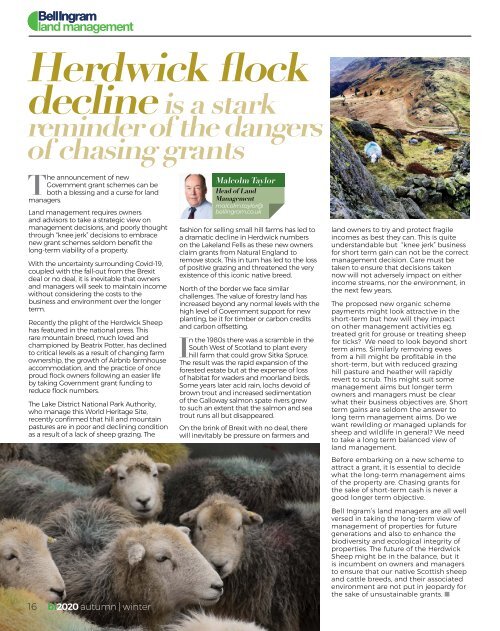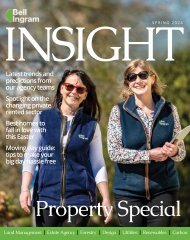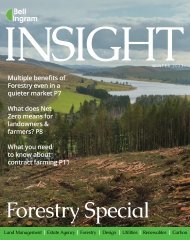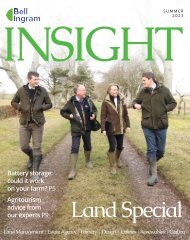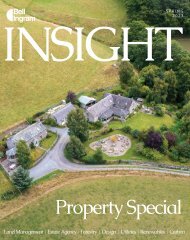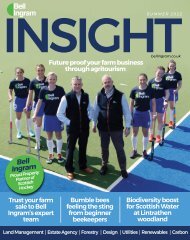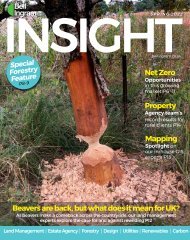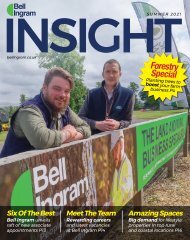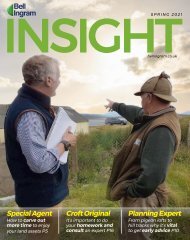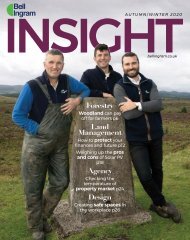You also want an ePaper? Increase the reach of your titles
YUMPU automatically turns print PDFs into web optimized ePapers that Google loves.
land management<br />
land management<br />
Herdwick flock<br />
decline is a stark<br />
reminder of the dangers<br />
of chasing grants<br />
he announcement of new<br />
Government grant schemes can be<br />
Tboth a blessing and a curse for land<br />
managers.<br />
Land management requires owners<br />
and advisors to take a strategic view on<br />
management decisions, and poorly thought<br />
through “knee jerk” decisions to embrace<br />
new grant schemes seldom benefit the<br />
long-term viability of a property.<br />
With the uncertainty surrounding Covid-19,<br />
coupled with the fall-out from the Brexit<br />
deal or no deal, it is inevitable that owners<br />
and managers will seek to maintain income<br />
without considering the costs to the<br />
business and environment over the longer<br />
term.<br />
Recently the plight of the Herdwick Sheep<br />
has featured in the national press. This<br />
rare mountain breed, much loved and<br />
championed by Beatrix Potter, has declined<br />
to critical levels as a result of changing farm<br />
ownership, the growth of Airbnb farmhouse<br />
accommodation, and the practice of once<br />
proud flock owners following an easier life<br />
by taking Government grant funding to<br />
reduce flock numbers.<br />
The Lake District National Park Authority,<br />
who manage this World Heritage Site,<br />
recently confirmed that hill and mountain<br />
pastures are in poor and declining condition<br />
as a result of a lack of sheep grazing. The<br />
Malcolm Taylor<br />
Head of Land<br />
Management<br />
malcolm.taylor@<br />
bellingram.co.uk<br />
fashion for selling small hill farms has led to<br />
a dramatic decline in Herdwick numbers<br />
on the Lakeland Fells as these new owners<br />
claim grants from Natural England to<br />
remove stock. This in turn has led to the loss<br />
of positive grazing and threatened the very<br />
existence of this iconic native breed.<br />
North of the border we face similar<br />
challenges. The value of forestry land has<br />
increased beyond any normal levels with the<br />
high level of Government support for new<br />
planting, be it for timber or carbon credits<br />
and carbon offsetting.<br />
I<br />
n the 1980s there was a scramble in the<br />
South West of Scotland to plant every<br />
hill farm that could grow Sitka Spruce.<br />
The result was the rapid expansion of the<br />
forested estate but at the expense of loss<br />
of habitat for waders and moorland birds.<br />
Some years later acid rain, lochs devoid of<br />
brown trout and increased sedimentation<br />
of the Galloway salmon spate rivers grew<br />
to such an extent that the salmon and sea<br />
trout runs all but disappeared.<br />
On the brink of Brexit with no deal, there<br />
will inevitably be pressure on farmers and<br />
land owners to try and protect fragile<br />
incomes as best they can. This is quite<br />
understandable but “knee jerk” business<br />
for short term gain can not be the correct<br />
management decision. Care must be<br />
taken to ensure that decisions taken<br />
now will not adversely impact on either<br />
income streams, nor the environment, in<br />
the next few years.<br />
The proposed new organic scheme<br />
payments might look attractive in the<br />
short-term but how will they impact<br />
on other management activities eg.<br />
treated grit for grouse or treating sheep<br />
for ticks? We need to look beyond short<br />
term aims. Similarly removing ewes<br />
from a hill might be profitable in the<br />
short-term, but with reduced grazing<br />
hill pasture and heather will rapidly<br />
revert to scrub. This might suit some<br />
management aims but longer term<br />
owners and managers must be clear<br />
what their business objectives are. Short<br />
term gains are seldom the answer to<br />
long term management aims. Do we<br />
want rewilding or managed uplands for<br />
sheep and wildlife in general? We need<br />
to take a long term balanced view of<br />
land management.<br />
Before embarking on a new scheme to<br />
attract a grant, it is essential to decide<br />
what the long-term management aims<br />
of the property are. Chasing grants for<br />
the sake of short-term cash is never a<br />
good longer term objective.<br />
Bell Ingram’s land managers are all well<br />
versed in taking the long-term view of<br />
management of properties for future<br />
generations and also to enhance the<br />
biodiversity and ecological integrity of<br />
properties. The future of the Herdwick<br />
Sheep might be in the balance, but it<br />
is incumbent on owners and managers<br />
to ensure that our native Scottish sheep<br />
and cattle breeds, and their associated<br />
environment are not put in jeopardy for<br />
the sake of unsustainable grants. n<br />
16 2 bi2019 bi<strong>2020</strong> winter autumn ❘ ❘ winter autumn ❘ ❘ winter bi<strong>2020</strong> bi2019 17<br />
3<br />
F<br />
or 121 years Bell Ingram<br />
has managed some<br />
of the UK’s finest<br />
agricultural and sporting<br />
estates.<br />
From Somerset to Sutherland,<br />
the firm’s experienced<br />
Chartered Surveyors oversee a<br />
large number of farms, estates<br />
and corporate properties, and<br />
our bespoke, personal service<br />
ensures our clients maximise<br />
their assets and comply<br />
with the ever changing rural<br />
management requirements.<br />
At Bell Ingram we believe<br />
the best value is achieved<br />
by quality of delivery and<br />
attention to detail. Our<br />
Chartered Surveyors use<br />
the latest technology and<br />
resources available, to achieve<br />
the best results.<br />
Bell Ingram operates primarily<br />
in the rural marketplace,<br />
advising on all aspects of<br />
rural property management,<br />
development, sales and<br />
valuations.<br />
Our Chartered Surveyors can<br />
adopt a full management<br />
service or act in an occasional<br />
advisory role, depending on<br />
your needs.<br />
Our core services include<br />
Forestry Management, Farm<br />
and Sporting Management,<br />
Planning Consultancy,<br />
Architecture, Estate Agency,<br />
House Letting, Accountancy<br />
as well as Minerals and<br />
Renewables advice.<br />
With further divisions acting in<br />
specialist areas, we are able to<br />
pool resources and knowledge,<br />
and all our professionals have<br />
ready access to an enviable<br />
amount of experience,<br />
technical information and<br />
comparables.<br />
People are at the heart of our<br />
business delivering consistently<br />
high standards of professional<br />
service across all departments.<br />
H<br />
ead of Rural Land<br />
Manaement Malcolm<br />
Taylor says: “Bell<br />
Ingram’s reputation is built<br />
on a deep understanding<br />
of our clients requirements<br />
in the rural land sector and<br />
our ability to deliver effective<br />
solutions tailored to clients’<br />
needs.<br />
“At Bell Ingram our staff<br />
pride themselves on a<br />
highly personal approach,<br />
outstanding service and<br />
attention to detail. The high<br />
levels of staff retention also<br />
mean that the firm’s clients<br />
can be sure of dealing<br />
with highly qualified and<br />
experienced people at all<br />
times.<br />
"At Bell Ingram<br />
we believe the best<br />
value is achieved<br />
by quality of<br />
delivery and<br />
attention to<br />
detail. "<br />
Rural Land<br />
Management experts<br />
with 121 years of experience<br />
“Much of our work comes<br />
through recommendations<br />
from satisfied clients and<br />
referrals from business<br />
partners. It’s a terrific<br />
compliment that people are<br />
happy to recommend the<br />
firm and is testament to the<br />
brilliant work done by Bell<br />
Ingram staff.”<br />
Established in 1899, the<br />
firm has a team of 110<br />
professional staff working<br />
across 10 UK offices (Perth,<br />
Aberdeen, Ambleside, Ayr,<br />
Beauly, Forfar, Morpeth,<br />
Northwich, Oban and<br />
Thirsk). n<br />
➤ For more information<br />
about our Rural Land<br />
Management Service<br />
please visit our website<br />
www.bellingram.co.uk/<br />
land-management


